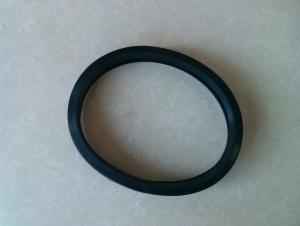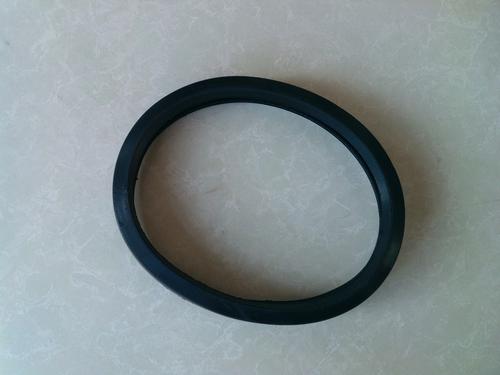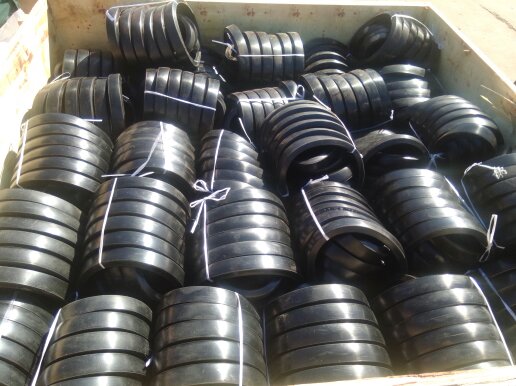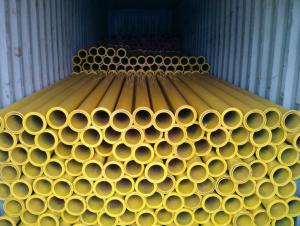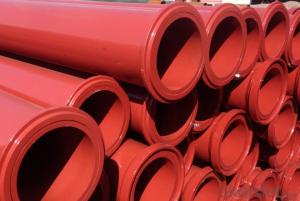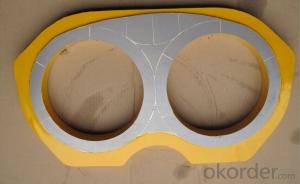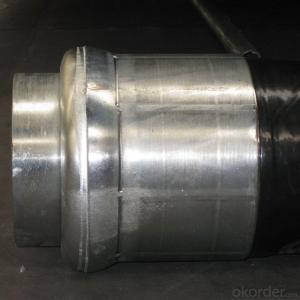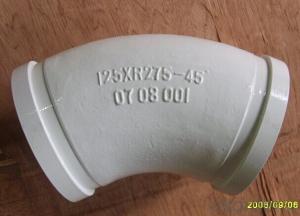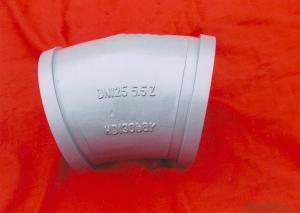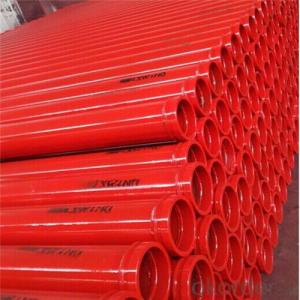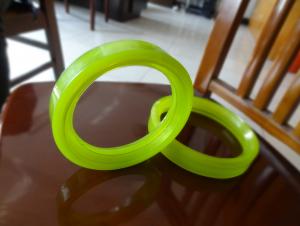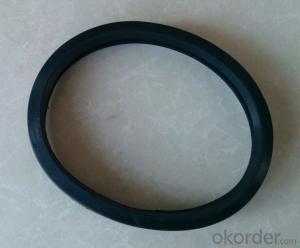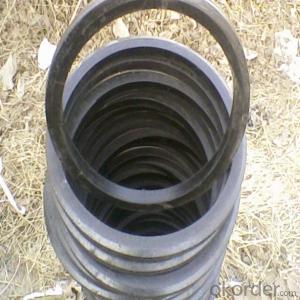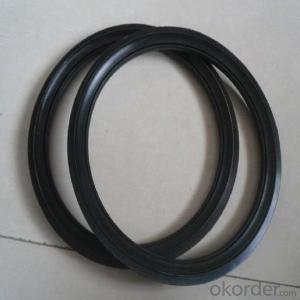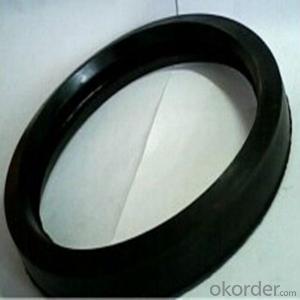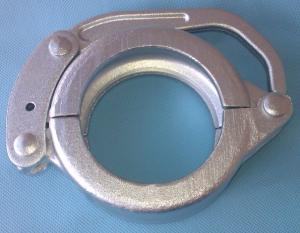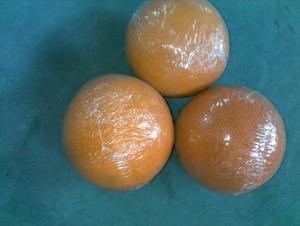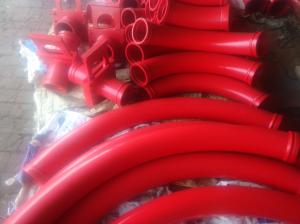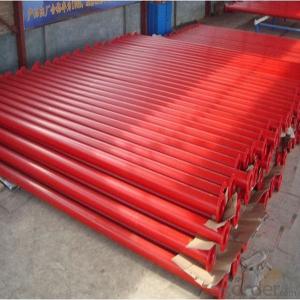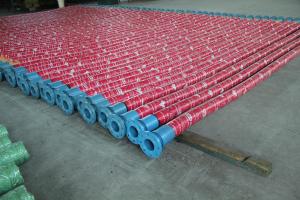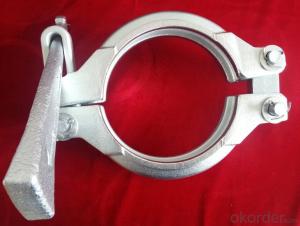RUBBER SEAL for Concrete Pump DN125 DN150
- Loading Port:
- Tianjin
- Payment Terms:
- TT or LC
- Min Order Qty:
- 10 pc
- Supply Capability:
- 10000 pc/month
OKorder Service Pledge
OKorder Financial Service
You Might Also Like
Product Description:
Product Name: Concrete Pump Rubber Seal 5''
1. Specification of Concrete Pump Delivery Rubber Seal 5''
Materials: ruber
Inner Diameter: 150mm, 125mm, 100mm
Outer Diameter: 148mm, 127mm etc.
Flange size: 148mm 127mm
Flange type: SK flange, ZX flange
Standards: ASTM A128-C
Color: Black
Notes: Total series of Concrete Pump Rubber Seal for different brand concrete pump (PUTZMEISTER, SCHWING, CIFA, SANY, ZOOMLION, IHI, KYOKUTO Etc)available from us, different length, different raw material pipe for customers choices.
2. Application of Concrete Pump Rubber Seal 5''
Widely used on concrete pump truck, concrete placing boom, trailer concrete pump etc, for concrete delivery.
Our concrete pump delivery pipes have been successfully exported to many countries from 1998, Our main markets as below: Middle East, Southeast Asia, America, Brazil, Italy, Russia, South Africa etc
Aiming at the largest concrete pump parts manufacturer, and reliable, professional supplier in China, we can supply concrete pump elbows, delivery pipes, casting or forging couplings, end rubber hoses, rubber pistons, tungsten wear plates, delivery cylinders, and other hydraulic parts, one stop service for your concrete pump parts and accessory business.
3. Package and Delivery of Concrete Pump Rubber Seal 5''
All the pipes directly put into Carton or woven bag,then put inot one 20feet or 40feet containers.
4.Production ofConcrete Pump Rubber Seal 5''
Our Concrete Pump rubber seals are made with advanced technology of rubber formula, rubber moulding,Baking, Etc, suitalbe for different size of pipe flanges.
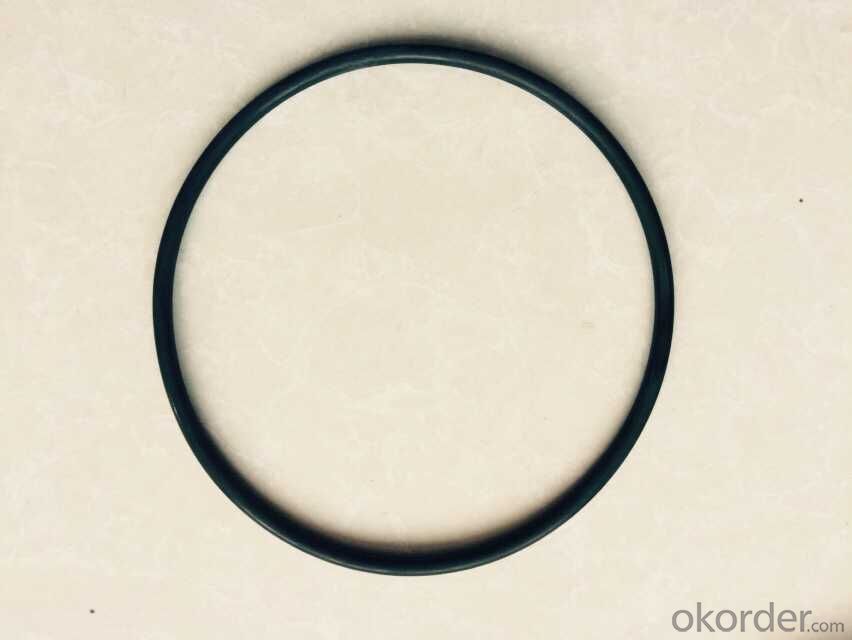
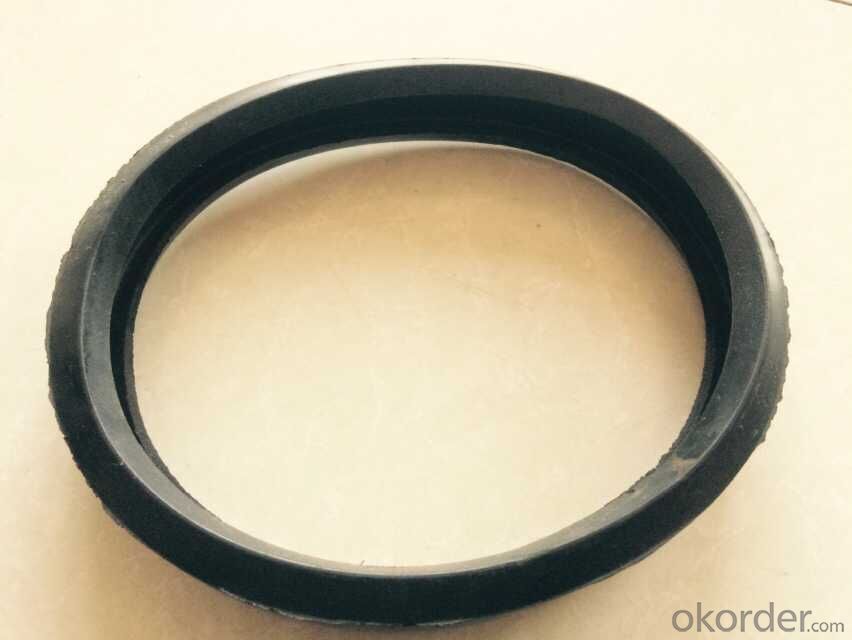
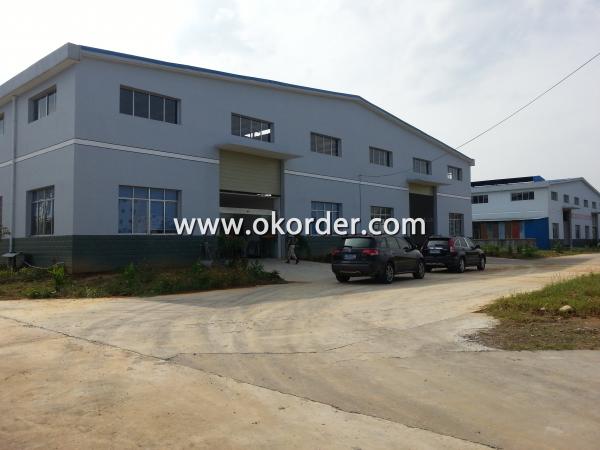
- Q: What are the advantages of using pre-assembled spare parts for concrete pumps?
- There are several advantages of using pre-assembled spare parts for concrete pumps. Firstly, they save time and effort as they come ready to use, eliminating the need for manual assembly. This allows for quicker repairs and reduces downtime for the concrete pump. Additionally, pre-assembled spare parts ensure compatibility and proper fit, reducing the risk of errors or mismatches during installation. They are also manufactured to meet specific quality standards, ensuring reliability and durability. Furthermore, using pre-assembled spare parts eliminates the need for specialized skills or knowledge for assembly, making it convenient for operators and reducing the chances of mistakes. Overall, pre-assembled spare parts offer efficiency, convenience, and reliability in maintaining and repairing concrete pumps.
- Q: How can a faulty filter affect the pumping process?
- A faulty filter can significantly affect the pumping process in several ways. Firstly, a faulty filter may become clogged or blocked, hindering the flow of fluid through the pump. This can result in reduced efficiency and increased energy consumption as the pump has to work harder to overcome the resistance caused by the clogged filter. The decreased flow rate can also lead to longer pumping times, which can be problematic in time-sensitive applications. Secondly, a faulty filter may fail to effectively remove impurities or contaminants from the fluid being pumped. This can be particularly problematic in industries where maintaining the purity or cleanliness of the fluid is crucial, such as in pharmaceutical or food processing applications. The presence of contaminants can compromise the quality of the final product or damage equipment downstream from the pump. Furthermore, a faulty filter can lead to increased maintenance and repair costs. If the filter is not functioning properly, it may allow larger particles or debris to pass through, which can cause damage to the pump components. This can result in increased wear and tear, decreased lifespan of the pump, and the need for more frequent repairs or replacements. Lastly, a faulty filter can also pose a risk to the overall system and its components. If the filter fails completely, it may allow foreign objects or particles to enter the pump, leading to potential blockages, damage to internal components, or even complete failure of the pump. This can result in costly downtime, loss of production, and the need for emergency repairs or replacements. In summary, a faulty filter can have detrimental effects on the pumping process, including decreased efficiency, compromised fluid quality, increased maintenance costs, and potential damage to the pump and system components. Regular inspection, maintenance, and timely replacement of filters are essential to ensure smooth and reliable operation of pumps in various industries.
- Q: What is the function of a concrete pump hydraulic filter?
- The function of a concrete pump hydraulic filter is to remove contaminants and impurities from the hydraulic fluid that is responsible for operating the pump. The hydraulic filter is designed to capture particles such as dirt, debris, and metal fragments that may be present in the hydraulic system. By removing these contaminants, the filter ensures that the hydraulic fluid remains clean and free from any potential damage-causing particles. This helps to maintain the overall performance and longevity of the concrete pump by preventing clogs, wear and tear, and potential damage to the pump's hydraulic components. Additionally, a clean hydraulic system reduces the risk of hydraulic fluid leakage, which can lead to costly repairs and downtime. Therefore, the concrete pump hydraulic filter plays a critical role in ensuring the efficiency, reliability, and durability of the pump's hydraulic system.
- Q: How often should concrete pump control boxes be inspected and replaced?
- Concrete pump control boxes should be inspected regularly to ensure proper functioning and safety. The frequency of inspections and replacements will depend on various factors including the usage of the concrete pump, the operating conditions, and the manufacturer's recommendations. In general, it is advisable to inspect the control box at least once a year or as per the manufacturer's guidelines. However, if the concrete pump is used extensively or subjected to harsh operating conditions, more frequent inspections may be necessary. This includes inspecting the electrical connections, switches, buttons, and indicators for any signs of wear, damage, or malfunction. Additionally, it is important to conduct inspections after any significant maintenance or repair work on the concrete pump, as well as after any incidents or accidents. Regular inspections help identify any potential issues early on, allowing for timely repairs or replacements, thereby minimizing the risk of breakdowns or accidents. As for replacements, control boxes should be replaced if they are damaged beyond repair or if they are outdated and no longer meet safety standards. It is important to consult the manufacturer or a qualified professional to determine the appropriate replacement schedule based on the specific conditions and usage of the concrete pump. Remember, regular inspections and timely replacements of concrete pump control boxes are crucial to ensure the safe and efficient operation of the equipment.
- Q: What is the purpose of a concrete pump carbide wear plate?
- The purpose of a concrete pump carbide wear plate is to provide a durable and abrasion-resistant surface that allows for the smooth and efficient transfer of concrete from the pump to the desired location.
- Q: Can I get spare parts for both concrete pumps with and without boom control systems?
- Yes, you can typically get spare parts for both concrete pumps with and without boom control systems. Many manufacturers and suppliers of concrete pumps offer a wide range of spare parts to meet the needs of different types of pumps. Whether it's for a pump with a boom control system or one without, you should be able to find the necessary spare parts from reputable suppliers. It is recommended to contact the manufacturer or supplier directly to inquire about the availability and compatibility of spare parts for your specific concrete pump model.
- Q: Are there any warranties or guarantees available for concrete pump spare parts?
- Yes, there are warranties and guarantees available for concrete pump spare parts. Many reputable manufacturers and suppliers offer warranties on their products, providing assurance of quality and performance. These warranties typically cover defects in materials or workmanship and may vary in duration and terms. It is advisable to inquire about the specific warranty or guarantee offered by the supplier before purchasing concrete pump spare parts.
- Q: Can concrete pump spare parts be repaired on-site, or should they be sent to a specialized repair facility?
- Concrete pump spare parts can be repaired on-site, depending on the complexity of the repair and the expertise of the maintenance personnel. However, for more intricate or major repairs, it is recommended to send the spare parts to a specialized repair facility where they can be properly assessed, repaired, and tested by professionals to ensure optimal functionality and safety.
- Q: How often should concrete pump S valves be inspected and replaced?
- Concrete pump S valves should be inspected regularly, ideally every 500 hours of operation or at least once a year. However, the replacement of S valves will depend on various factors such as the quality of the concrete being pumped, the frequency of use, and the overall condition of the valve. It is recommended to consult the manufacturer's guidelines and seek professional advice to determine the specific timing of S valve replacement.
- Q: Can concrete pump spare parts be coated with corrosion inhibitors for long-term storage?
- Concrete pump spare parts have the capability to be coated with corrosion inhibitors in order to ensure long-term storage. Corrosion inhibitors, which are chemicals, can be applied onto metal surfaces to either prevent or minimize the corrosion process. By administering a coating of corrosion inhibitor onto concrete pump spare parts, a protective layer can be formed, preventing any contact between moisture, oxygen, and the metal. Consequently, the chances of corrosion are significantly reduced. This becomes particularly crucial when considering long-term storage, as the spare parts might encounter harsh environmental conditions or be stored in damp areas. Ultimately, the corrosion inhibitor coating serves to extend the lifespan of the spare parts and guarantee their preservation until they are required for use.
Send your message to us
RUBBER SEAL for Concrete Pump DN125 DN150
- Loading Port:
- Tianjin
- Payment Terms:
- TT or LC
- Min Order Qty:
- 10 pc
- Supply Capability:
- 10000 pc/month
OKorder Service Pledge
OKorder Financial Service
Similar products
Hot products
Hot Searches
Related keywords
